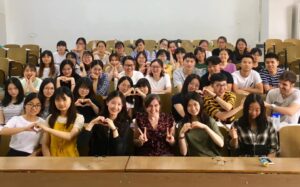For many years, just having a “white” appearance and a European or North American accent was enough to get an entry-level English teaching position at learning centers around the world. Just a decade ago, job boards were saturated with advertisements and incentives encouraging foreigners to teach abroad in China. In recent years, however, several countries such as South Korea, the United Arab Emirates and China, have implemented minimum credential standards for teachers to legally work as an English language educator in their countries.
Quality Over Quantity for Foreign English Teachers in China
Unlike other nations, when China makes policy compliance crackdowns on a grand scale, the sheer number of people affected makes news. In 2019, China instituted new standards for foreign language teachers to improve the quality of English Language Teaching (ELT) and to combat the estimated 260,000 who are teaching illegally in the country.
Now, in order to teach English in China as a foreigner, the teacher needs to be under 60 years old (55 for women), have a Z-class work visa, be a native speaker with a valid passport from one of the seven acknowledged English-speaking countries …
“Bert” is an international school teacher who has been based in Shanghai since 2015. (Like all the teachers we spoke with in this story, he asked that we not use his real name). He recalls, “There was a point where a 23-year-old Russian teacher, who could barely string together a sentence in English, who didn’t have any teaching credentials, was more valuable to a tutoring center than a local teacher.” “Gwen,” a former teacher in Guangzhou who has lived in China for five years, says of the 2019 teaching reforms, “China is trying to clean up the English teaching industry. Before, deportation raids for teachers working at language schools and teaching English on business visas were informal and infrequent enough that, after a crackdown, the school would just hire new teachers, and the cycle of uncertified, improperly documented English teaching would begin again. What they do now is more systematic. They do checks at the same time at all schools. They are also requiring valid teaching credentials and accurate visa documentation.”
In an often-referenced article, lawyer Dan Harris (whose legal firm has an office in Beijing) outlines the caveats associated with working for learning centers with slipshod recruiting practices for teachers. Some traps Harris warns against include having payments or passports withheld by the learning centers and institutions that hire teachers without experience and proper training.
Now, in order to teach English in China as a foreigner, the teacher needs to be under 60 years old (55 for women), have a Z-class work visa, be a native speaker with a valid passport from one of the seven acknowledged English-speaking countries, and have two years of teaching experience, a bachelor’s degree, a TESOL certification and a healthy physical exam. The teacher also needs to clear a criminal background check from their home country and may be compelled to pass a drug test.
China has a complicated history with drug regulations, dating back to the opium epidemic that ravaged East Asia in the late 19th century. China has adopted a zero-tolerance policy regarding drug possession, consumption and distribution, and it is strictly applied to foreign teachers. Bert observes, “I started noticing, about three years ago, that police were increasing drug testing on foreign workers. The rule is really simple: If you get caught having used drugs, the Chinese government gives you 14 days to pack your bags and leave before being deported. Several teachers have been done-in from that. China does hair-sample drug testing. Teachers used to use the excuse that they’d just come back from holidays in the USA and Europe (where some drugs have been legalized), but the police don’t let explanations like that slide anymore.”

However, for Chinese-American teachers like “Carl,” a Ph.D. student and an English teacher trainer in Beijing from 2017-2019, being a qualified American with a clean record was not enough to meet China’s subjective native-speaker expectations. Carl says, “China has a lot of problems hiring English teachers who are non-white. They try to cloak the term ‘native speaker’ to mean ‘white.’” Before being hired as a teacher trainer in 2017, Carl applied for years to ELT jobs in China. With university degrees in applied linguistics, a TESOL certificate from an accredited program, and being a bilingual American citizen of Chinese heritage, he was confident he would meet the necessary requirements to land a teaching job. Carl explains, “I knew people were getting hired just because they were native speakers, with no relevant degrees or certifications. I knew I had a decent enough resume and the experience to apply.” Yet, he was repeatedly passed over in the application process once the recruiting personnel realized Carl was not a white native speaker. Carl recalls a Skype job interview, “As soon as they saw what I looked like, the interview ended.”
“China has a lot of problems hiring English teachers who are non-white. They try to cloak the term ‘native speaker’ to mean ‘white.’”
Carl is not alone. In her 2014 blog post, Ashley Evangelista recounts her experience teaching in China as a Black American female: “Currently, the visibility of non-white native English speakers in countries like China is astoundingly low, …however, I believe that changing this will have a disruptive effect, breaking the illusory notion that English (and thereby power) is the domain of whiteness alone…” While China is expanding its efforts to improve the teaching standards of its foreign ELT instructors, it has been slow to incorporate the wide array of racial diversity in the native-speaking population. Foreign teachers who do not meet the stereotypical image of Westerners must also contend with the Chinese social concept of “mianzi.” Mianzi literally translates to “face value.” There is a socio-cultural incentive for schools to hire white-appearing foreign teachers, even if they are unqualified, in order to increase the school’s mianzi, making the school more attractive to parents who are willing to pay money for the appearance of native-speaker instruction.
Carl doesn’t see the stereotypes that have spurred that discrimination as being a solely Chinese problem, saying, “In our media in the USA, we have a lot of problems, because most of what we portray on TV and in films is white people. Their ‘othering’ of me is [because] they are only exposed to white people on television or black people portrayed in very stereotypical fashions. Their most significant link to the black community is through professional basketball players because that’s all they are exposed to of Black Americans.” As an American of Asian heritage, Carl understands how that lack of Asian Americans in American media can skew perspectives abroad. He emphasizes, “Because they never see any Asian Americans, or Chinese Americans, in particular, on TV, so I can’t be American to them. There is a mismatch between what they see in the media and what I am. They don’t know how to place me.”
English Education Behind the Great Firewall
Even before recent changes in privacy and security, foreign teachers were already contending with differences in expectations for learning and using English. The ultimate goal of learning English in China is to have a marketable skill that will help the language learner succeed in school or in future employment prospects. English is the language of trade, international communication and scientific exchange, but it’s not the language of media or national connectivity. Most students do not learn English in hopes of studying abroad or emigrating. For students in the Chinese K-12 education system, the central motivation to learn English is to get a higher overall score on the “gaokao,” the multi-day, high stakes national college entrance examination at the end of high school that determines to which tiers of universities and to which subject major prospective students can apply.
Bert says of the gaokao, “In my school, it’s not uncommon for grade 12 students to take a whole year off to study before the test. It’s much more intense than the SAT. A student’s performance is the sole factor for where and how [the student] continues their education.” Furthermore, once students graduate from university, having communicative English skills gives them an edge in the job market. “Shannon,” a former English teacher trainer who has taught in China for more than four years, explains, “It’s a critical way employers can differentiate among the massive volume of job candidates with the same experiences and degrees because they all go through the exact same government-approved education system. So the only measures of discernment left are “guanxi” (the socio-cultural system of symbiotic networking and relationship-building) and the level of language skills.”

Aside from the dogged intensity of students’ studies, one of the first realities foreign teachers in China contend with is the difference in expectations of privacy and security compared to Western countries. One major difference is using the internet under the Great Firewall (GFW), the term used to describe the blend of legislative policies and surveillance technologies that regulate internet content and usage by people in China. Most Chinese language learners cannot use VPNs to bypass internet censorship – or even more surprisingly, few even have an interest in subverting the GFW. The Chinese government has even created its own versions of most major apps, search engines and social media platforms in Mandarin. They are geared toward a Chinese audience and are incredibly popular. Acclimating to constant government oversight online, in the classroom and in curriculum development can be a challenge for foreign teachers. Before starting his teacher training post in Beijing, Carl was informed by his employer not to discuss the “Three T’s” in China: Tibet, Taiwan and Tiananmen Square. Carl recalls the first time he realized the camera in his classroom was actively being used to monitor his classes: “A colleague, who was a Spanish teacher at his university, was playing a movie for his students. Not long into the movie, a school administrator came into the class to question what he was doing. For me, it just felt like confirmation that the cameras were not for show; they are turned on and working, and someone is watching. Except for inside your home, in China, you can just always assume there are three cameras pointed at you at all times.”
English Language Teaching Bumps Into Chinese Cultural Policies
However, governmental oversight of what teachers impart to Chinese students does not end at the classroom doors. A 2020 mandate required that all teaching materials for English courses must be taught using Chinese-produced and published materials; all foreign-made materials were banned in K-12 education. This ban can be seen as a clever way for China to direct its education funding to support local publishers and educational innovators. China is still the largest and fastest-growing ELT market in the world. Currently, there are thousands more potential local teachers in ELT training programs in China, a strategic move that appears to empower in-country English language training. However, some foreign teachers don’t view the ban in the same way. Carl says, “I could see the ban as a shield to ignore copyright infringement.” He remembers noticing a Chinese-produced textbook that was uncannily similar to a popular foreign-made textbook he was very familiar with; the textbook’s redesigned formatting was so poor, he noticed similarities and reproduction errors immediately. From her own experience creating a textbook that could be sold in China, Shannon explains: “It’s hard to figure out how to help train teachers now and offer them materials they can use. During my own book publishing process, we had to rethink the concepts to be more Sino-centric and less critical of the CCP” (the Chinese Communist Party).
This is not the only ban that has impacted the soft-power cultural influence of English on the cultural competency of the learners. Just before Christmas 2018, China imposed a ban on the public celebration of non-Chinese holidays and restricted the celebration of foreign holidays in schools. The rationale provided by the Chinese leaders was that it encouraged the younger generations to focus on celebrating their own national holidays, and fostered a greater sense of national heritage and patriotism. Yet, to teachers like Shannon, it felt more like a subtle signal that international cultural exchanges that could compete for youth attention are no longer welcome in China. Shannon describes her experience teaching after the ban: “I couldn’t teach anything having to do with Halloween, Thanksgiving or Christmas, or host school events related to those things. For me, I questioned, why am I even here as a foreigner if I can’t share my culture? It was something I had to grapple with, and I kept discussing it with friends, both foreign and local. Local Chinese friends and colleagues assured me that it’s not that they don’t want to learn about my culture; it’s that the Chinese government doesn’t think young people are valuing Chinese culture enough. They hold that the holiday ban is to encourage the youth to celebrate Chinese holidays.”
Chinese propaganda is ubiquitous and obvious; banners and signs adorned with the colors of the Chinese flag and touting the virtues of a united Chinese identity are posted on city streets and university campuses. Shannon even noticed one propaganda banner strung up outside the foreign language department building at a university and reading, “A civilized tongue is a Mandarin tongue.” However, Shannon doesn’t see this as a slight against the English language or other countries. Instead, she says, “A lot of the national propaganda isn’t an attack on specific countries. The policies aren’t targeted at foreigners; they’re targeted towards ethnic minorities. The only Chinese identity that China encourages for national identity is Han. It’s about creating an illusory ideal of a model Chinese citizen.” A good Chinese citizen may speak English for education or for business, but they speak Mandarin for the culture.

Decreased Value of Cultural Currency Impacts Educational Exchange
Interestingly, as social pressure to create a unified Chinese identity increases, and new regulations limit the amount of foreign media that enters China, young Chinese students (the target demographic for education exchanges and study abroad programs) are becoming less interested in Western culture. There are many reasons for the Chinese becoming more culturally insular, but one major shift is that they are less dependent on foreign countries for media and entertainment. China has its own thriving media, entertainment and social networking industries that operate under the surveillance of the CCP within the GFW. Gwen sees this shift as a “less of a rejection of American culture and more just not- even noticing that it exists.”
“I asked them how many wanted to live abroad, and not many did, and that was surprising to me. It’s the first time that’s happened in any teaching context.”
That attitude is trickling into education exchanges. “Dan,” an English for Academic Purposes (EAP) teacher at an international university in Shanghai since 2018, recounts an interaction he had with his students regarding their reasons for studying English. Dan says, “I asked them how many wanted to live abroad, and not many did, and that was surprising to me. It’s the first time that’s happened in any teaching context.” Gwen says, “In Chinese media, America is portrayed as a dangerous place for Chinese people. It perpetuates ideas that if Chinese nationals travel to America, they will contract COVID-19, or be a victim of anti-Asian racism or be killed by gun violence.” President Trump also derogatively referred to the COVID-19 outbreak as “the kung flu” and “the Chinese virus.” With fears of racist, anti-Chinese sentiment instilled by American media rhetoric, some Chinese parents are reluctant to send their bright, young students to America for education.
Sino-American political tensions have also affected students’ willingness to study abroad in the US and their parents’ willingness to send them. During the Trump administration, three key events negatively impacted Chinese nationals in American study abroad programs. In 2020, the Trump administration made a series of policy decisions that affected Chinese student exchanges. The first was in August 2020 when American Republican Senator Ben Sasse accused the Confucius Institutes of “spreading communist propaganda and spying on Chinese students studying in the free world.” The Confucius Institutes are Chinese language and cultural centers that are typically hosted at universities and funded by the Chinese government. They act as an on-the-ground campus resource center for Chinese nationals studying abroad in America. Next, the Trump administration proposed legislation that would bar any persons with CCP memberships from traveling to the US. Yet, according to Shannon, membership in the CCP, essentially China’s only political party, is not a direct threat to democracy in America. Shannon reports, “Lots of people join the CCP because they want government jobs. It’s a reliable route to the middle class in China. But now, if you’re a student member of the CCP Youth League in university, you have essentially forfeited your opportunity to study abroad for a decision you made as a teenager to volunteer to support your country’s political party.”
Then, the Trump administration sought to ban WeChat, the popular Chinese social media platform, on American application hosting servers, because it was deemed a threat to American national security. China does not allow foreign social media to be hosted within the GFW, and they have developed WeChat as a popular alternative to Facebook and WhatsApp. Shannon explains, “If you’re a Chinese student going to America, you have access to all the social media apps in America, but you can’t contact anyone from home. You won’t have access to Chinese social media platforms where all your friends, family and social connections are in your home country. If Chinese students go to study in the USA and can’t even [use social media to] talk to their friends and family while they are there, why would they even want to go?” The WeChat ban was met with public criticism from WeChat users and pushback from U.S.-based media hosting platforms like Apple and Disney. Ultimately, a California federal judge filed an injunction in October 2020 to curb the WeChat ban, asserting that the executive order challenges First Amendment rights. The federal judge also sided with WeChat users, who argued that the WeChat ban would cause undue hardship as the platform is a primary means of communication for the global Chinese community.

“It’s easy to imagine that the skill of English language may be downplayed in China due to Sino-American tension and competition over international influence. I could see how China would want to use English as a tool in that way.”
Keeping young talent in-country is a great way to prevent brain drain. Bert comments, “Every country is focused on how to best educate their youth, and that’s what China is trying to do now, too. They are trying to make education services better. They want to help the children of this country. The decisions I’ve seen made here to clean it up and make it better make sense. They are setting up their children to have the best future in the global economy, just like any other country would do. China is not making decisions about its education system and wondering how it might negatively impact America.” Nonetheless, the reality is that China does not have enough universities to meet its prospective students’ demands for higher education, and therefore China relies on foreign countries to educate some of its wealthy and most talented students; however, over the last five years, universities in the U.S. have seen a steep decline in Chinese students in their intensive English programs. Dan posits, “It’s easy to imagine that the skill of English language may be downplayed in China due to Sino-American tension and competition over international influence. I could see how China would want to use English as a tool in that way.”
On July 1, 2021, China celebrated the 100th anniversary of the CCP. There has been speculation President Xi Jinping might use the celebration to recenter the government philosophy around his agenda. For years, a key focus of his agenda has been increasing the standards of education for Chinese people. President Xi’s administration has made great strides in supporting Chinese-created English language learning materials, making schools accountable for hiring qualified personnel, and making sure Chinese culture and heritage are valued in national and global contexts. In order to meet the demands of the changing ELT market in China, foreign teachers must be prepared to meet higher qualifications, abide by new policy norms and prepare for paradigm shifts as technology and Sino-American politics develop in a new American political administration.








